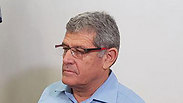
In the submarine affair, also known as Case 3000, police are investigating a corrupt system of alleged bribery over the purchase of submarines and patrol boats from Germany for the Israeli Navy.
Among the Israeli officials suspected in the case are former National Security Advisor Avriel Bar-Yosef, former Navy commander Maj. Gen. (res.) Eliezer Marom, former minister Eliezer (Moodi) Sandberg and former PMO burea chief David Sharan.
Ganor, who served as ThyssenKrupp's representative in Israel, has been giving testimony to the police for months, incriminating the other suspects in the case. He has also revealed the alleged methods he used to personally gain from the military acquisition deals.
According to Ganor, he came up with the plan during a meeting with Bar-Yosef. Ganor said he met with Bar-Yosef to advance the plan and update him on its details.
While formulating the plan, Ganor figured that there will be need for the additional submarines in light of the defense establishment's demands, and that the different Knesset committees approving the deal won't examine the price too closely.
"We planned an acquisition of three additional submarines, which cost something like $1.8 billion, at the price of $2.2 billion," he told police investigators.
The plan never quite materialized. But if it had come to pass, the State of Israel would've paid $400 million over the price of the submarines, while Ganor's percentage-based commission would've increased accordingly as well.
Ganor explained to police investigators that he planned to raise the price and offer ThyssenKrupp the inflated deal.
"In this deal, they were supposed to gain, and so was I," he told police. Meaning, in addition to the bloated commission he would've received from the deal, he also expected to be rewarded monetarily by the Germans for getting them a better deal.
Despite declarations made by Attorney General Avichai Mandelblit early in the investigation that Israel's political leadership is not involved in the case, testimonies gathered by police raise questions that require further investigation.
For example, Ganor told police he "hired" the services of attorney David Shimron—Prime Minister Benjamin Netanyahu's cousin—for his ties to the government, among other reasons. Netanyahu's special envoy attorney Yitzhak Molcho, who was questioned by police several times, was asked if he used his ties to the prime minister to promote the German acquisition deal—which he vehemently denied.
Prime Minister Netanyahu himself is not a suspect in the case.
As the investigation drags on, questions have been raised about the strength and nature of Ganor's testimony.
Defending the decision to sign a state's witness agreement with Ganor, law enforcement officials insisted he's one of the most important state's witnesses ever recruited.
"He (Ganor) presented to us all of the defense establishment's acquisition methods, and mostly all of the rot inside," said one senior law enforcement official.

















